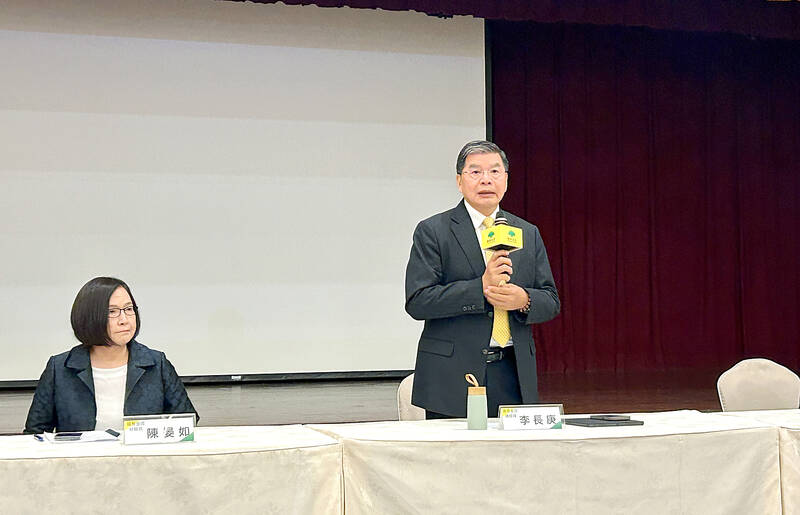Cathay Financial Holding Co (國泰金控) yesterday said that the local currency’s sharp appreciation has limited impact on its life insurance arm, thanks to 20 years of experience in managing foreign exchange risk.
Cathay Life Insurance Co (國泰人壽) has stood by a dynamic and flexible hedging strategy, which maintained total foreign exchange losses — including valuation changes and hedging costs — at NT$7.3 billion (US$243.15 million), Cathay Life spokesman Lin Chao-ting (林昭廷) told an investors conference in Taipei.
Unrealized losses would ease to NT$5.4 billion after factoring in gains from other currency operations, compared with Cathay Life’s NT$5 trillion in overseas assets — primarily in US corporate bonds, Lin said.

Photo: CNA
The New Taiwan dollar rose 3.6 percent against the US currency last month and has increased another 6.1 percent this month, raising market concerns over possible erosion of capital sufficiency and profitability among local life insurers.
Fitch Ratings and Taiwan Ratings issued separate warnings about domestic life insurers’ profitability outlook, attributable to foreign exchange volatility.
Cathay Life’s foreign exchange exposure is well-controlled, as it has significantly increased its traditional hedging ratio since late 2023 by taking advantage of low-cost opportunities in the non-deliverable forward market, Lin said.
In the previous quarter, the insurer raised its traditional hedging ratio from 65 to 69 percent, while extending hedge tenors from one-to-three months to six-to–24 months, he added.
It also increased its allocation for non-greenback currencies, further enhancing its alternative hedging effectiveness, Lin said.
Only 22 percent of Cathay Life’s portfolio, or about NT$840 billion, is exposed to foreign exchange risk, he said.
With 40 percent covered by alternative hedging tools, the exposure impacting the income statement is limited to about NT$560 billion, Lin said.
For every 1 percent appreciation in the NT dollar, Cathay Life would incur a manageable NT$2 billion loss in foreign exchange, he said.
Cathay Life has also filed a request with the Financial Supervisory Commission to use a new foreign exchange reserve mechanism that would allow the insurer to fully offset foreign exchange losses for this month, even if the NT dollar continues to appreciate, Lin said.
As of March, Cathay’s foreign exchange reserve amounted to NT$30.5 billion, with an extra NT$3 billion provisioned for the January-through-April period, he said.
Even if the NT dollar gains 10 percent to reach NT$29.5, Cathay’s risk-based capital ratio would remain at a robust 329 percent, down from 359 percent in December last year, but still well above the regulatory minimum of 200 percent, Lin said.
The local currency yesterday closed up NT$0.047 at NT$30.023 in Taipei trading.
The net worth ratio would decline by 0.7 percentage points to 8.18 percent, also comfortably above the 3 percent threshold, Lin said.

CHIP RACE: Three years of overbroad export controls drove foreign competitors to pursue their own AI chips, and ‘cost US taxpayers billions of dollars,’ Nvidia said China has figured out the US strategy for allowing it to buy Nvidia Corp’s H200s and is rejecting the artificial intelligence (AI) chip in favor of domestically developed semiconductors, White House AI adviser David Sacks said, citing news reports. US President Donald Trump on Monday said that he would allow shipments of Nvidia’s H200 chips to China, part of an administration effort backed by Sacks to challenge Chinese tech champions such as Huawei Technologies Co (華為) by bringing US competition to their home market. On Friday, Sacks signaled that he was uncertain about whether that approach would work. “They’re rejecting our chips,” Sacks

NATIONAL SECURITY: Intel’s testing of ACM tools despite US government control ‘highlights egregious gaps in US technology protection policies,’ a former official said Chipmaker Intel Corp has tested chipmaking tools this year from a toolmaker with deep roots in China and two overseas units that were targeted by US sanctions, according to two sources with direct knowledge of the matter. Intel, which fended off calls for its CEO’s resignation from US President Donald Trump in August over his alleged ties to China, got the tools from ACM Research Inc, a Fremont, California-based producer of chipmaking equipment. Two of ACM’s units, based in Shanghai and South Korea, were among a number of firms barred last year from receiving US technology over claims they have

It is challenging to build infrastructure in much of Europe. Constrained budgets and polarized politics tend to undermine long-term projects, forcing officials to react to emergencies rather than plan for the future. Not in Austria. Today, the country is to officially open its Koralmbahn tunnel, the 5.9 billion euro (US$6.9 billion) centerpiece of a groundbreaking new railway that will eventually run from Poland’s Baltic coast to the Adriatic Sea, transforming travel within Austria and positioning the Alpine nation at the forefront of logistics in Europe. “It is Austria’s biggest socio-economic experiment in over a century,” said Eric Kirschner, an economist at Graz-based Joanneum

France is developing domestic production of electric vehicle (EV) batteries with an eye on industrial independence, but Asian experts are proving key in launching operations. In the Verkor factory outside the northern city of Dunkirk, which was inaugurated on Thursday, foreign specialists, notably from South Korea and Malaysia, are training the local staff. Verkor is the third battery gigafactory to open in northern France in a region that has become known as “Battery Valley.” At the Automotive Energy Supply Corp (AESC) factory near the city of Douai, where production has been under way for several months, Chinese engineers and technicians supervise French recruits. “They